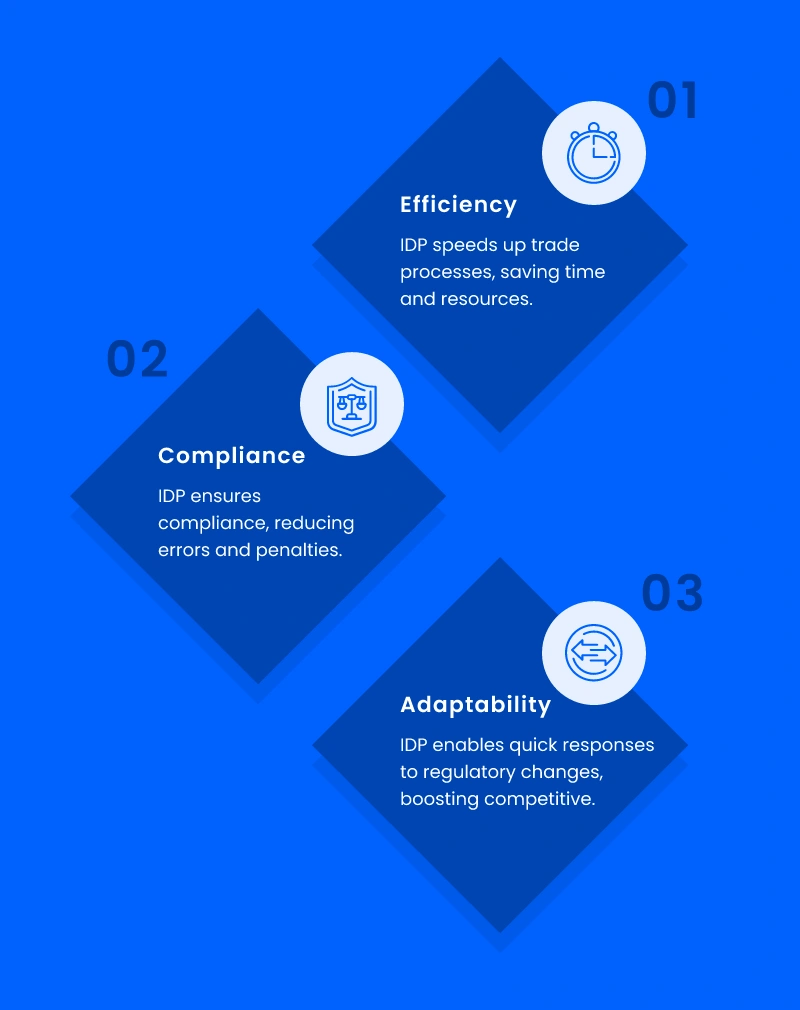Fast & Accurate ENS GB & EU ICS2 Solutions Built for You.
The ROI of IDP Technology: Quantify the Value for Your Business
-
Freya Jane
- Director of Customer's Success
The major challenge in international trade is managing complicated rules and ensuring that documents are processed quickly. However, reaching this level of efficiency can take time and effort.
For trading businesses of all sizes, manual data input from customs documents continues to be a laborious and error-prone procedure that may cause higher expenses and possible compliance issues. This is where IDP technology appears as a transformative force.
This blog explores the measurable return on investment (ROI) potential that automated data capture technology provides to companies in the global trade and customs industry. We will look at how IDP technology simplifies document processing procedures, analyse its advantages, and provide an organised approach for estimating its potential ROI.
Improved efficiency across industries using IDP
Intelligent document processing (IDP) is transforming customs and international commerce procedures. Here is how:
- Streamlined Customs Declarations: By automating data collection, IDP shortens processing times and guarantees precision in customs declarations.
- Enhanced Logistics Efficiency: Automating customs documents such as the Bill of Lading reduces processing time, which minimises shipping and logistics delays.
- Faster Import/Export Documentation: IDP expedites operations such as importing/export license processing and commercial invoice processing, hence accelerating clearing processes.
- Effective Compliance Management: IDP automates data capture and extraction from customs laws and trade agreements to help manage compliance.
Advantages of IDP for customs and international trade businesses
Implementing IDP technology provides several benefits customised to the special issues of international commerce and customs operations:
- Efficiency gains: Businesses may drastically cut down on manual labour and processing times by automating document processing procedures, which will result in more efficient operations.
- Improvement of accuracy: IDP technology reduces human data input mistakes, guaranteeing the accuracy and reliability of vital trade documents.
- Savings: By automating document processing, labour costs and operating expenditures are decreased, increasing cost-effectiveness.
- Enhancement of compliance: IDP solutions reduce the likelihood of non-compliance fines by making it easier to adhere to the intricate regulatory standards regulating global trade and customs operations.
Understanding ROI analysis for IDP implementation

When contemplating the use of IDP technology in customs and trade procedures, it is critical to perform a thorough Return on Investment (ROI) study. Here’s a tailored summary of the three main categories for determining ROI in this context:
Enhanced trade and customs efficiency and cost savings
IDP technology expedites trade agreements, customs declarations, and processing of other relevant documents. Businesses may save a great deal of both time and resources by automating repetitive operations and minimising human involvement. For instance, quicker processing times result in shorter wait times for customs clearance, which lowers the expenses of storage and demurrage related to delayed goods.
Enhanced compliance and risk management
Through precise and speedy document processing, IDP solutions improve adherence to trade agreements and customs laws. Businesses may avoid fines and penalties for non-compliance by decreasing mistakes and delays in documentation. Furthermore, increased compliance encourages better risk management techniques, which reduces the possibility of interruptions to global trade activities.
Capacity to adjust to changing trade dynamics
IDP technology lets businesses react quickly to modifications in tariffs, trade laws, and customs processes. By automating document processing procedures, businesses may respond to changing needs more quickly and release updated products. This adaptability is critical for being competitive in the ever-changing world of global trade.
Conducting an ROI analysis is critical for correctly assessing the financial effect of IDP adoption in customs and trade operations. By quantifying the advantages in terms of cost savings, and improved compliance, businesses can make more educated decisions about investing in IDP technology.
Quantifying benefits of IDP in customs and trade operations
To assess the potential advantages of using automated document extraction systems in customs and trade procedures, we must examine the following factors:
Time savings
Estimate how much time can be saved by automating document extraction operations. Assume that a customs brokerage company spends 15 minutes on average processing 1,000 import/export documents by hand. This time can be cut down to five minutes per document using automation.
- Manual processing time = 15 minutes per document x 1,000 documents = 15,000 minutes.
- Automated processing time = 5 minutes per document x 1,000 documents = 5,000 minutes.
- Time saved = 15,000 − 5,000 = 10,000 minutes.
Labour Costs
Determine how much labour costs can be saved by cutting the processing time. Assume an average hourly wage of £15 for manual data input people.
- The labour cost is £0.25 per minute (£15 per hour / 60 minutes).
- Labour cost savings = time saved x labour cost per minute.
- Labour cost savings = 10,000 minutes x £0.25 per minute.
- Labour cost savings = £2,500
Error Reduction
Calculate the cost savings from eliminating mistakes in document processing. If the current error rate in manual data entry is 2% and can be lowered to 0.5% with automation:
- Current error cost = 2% X 1,000 documents X £75/error = £1,500 per day.
- Automated error cost = 0.5% X 1,000 documents X £75/error = £375 per day.
- Error reduction = Current error cost − Automated error cost.
- Error reduction = £1,500 – £375 per day
- Error reduction = £1,125 per day
Increased Throughput
Evaluate how automation could boost the capacity for document processing. Suppose the automated solution allows the company to process an additional 100 documents each day:
Suppose the automated solution allows the business to process 100 additional documents in a day:
- Additional throughput = 100 documents per day.
Considering an average value of £250 per document, the additional revenue generated is:
- Additional revenue = 100 documents * £250 each = £25,000 per day.
Consider intangible advantages
In addition to measurable advantages, emphasise intangible benefits such as increased data accuracy, client satisfaction, and decision-making capabilities. Although difficult to quantify, these features considerably increase the total value of the solution for customs and trade processes.
Takeaway
The use of Intelligent Document Processing (IDP) technology offers a revolutionary potential for trade and customs processes. IDP provides visible benefits and a strong return on investment by optimising procedures, boosting productivity, and guaranteeing compliance. A complete ROI analysis allows businesses to measure the benefits, such as reductions in time and expenses, greater accuracy, and the ability to adjust to changing trade dynamics.
Make an appointment for a demo with our team right now to learn how iCustoms’ IDP software may significantly increase your trade company’s return on investment. See firsthand how our tailored solution streamlines workflows, lowers mistakes, and increases efficiency, opening the door to cost savings and higher production. Don’t miss out—schedule your demo today!
FAQ's
What does IDP stand for in technology?
In technology, IDP stands for Intelligent Document Processing.
What are the techniques applied in IDP?
IDP uses techniques such as optical character recognition, natural language processing, machine learning, and artificial intelligence.
What are the benefits of using IDP Software?
Using IDP software has several advantages, such as better compliance, less manual work, more accuracy in data extraction, and enhanced efficiency.
What problem do IDP tools solve?
IDP products address the issues of human data entry, slow document processing, and error-prone document handling.
You may also like:
Struggling to Extract, Catagorise & Validate Your Documents?
Capture & Upload Data in Seconds with AI & Machine Learning
Subscribe to our Newsletter
About iCustoms
Struggling to Extract, Catagorise & Validate Your Documents?
Capture & Upload Data in Seconds with AI & Machine Learning

